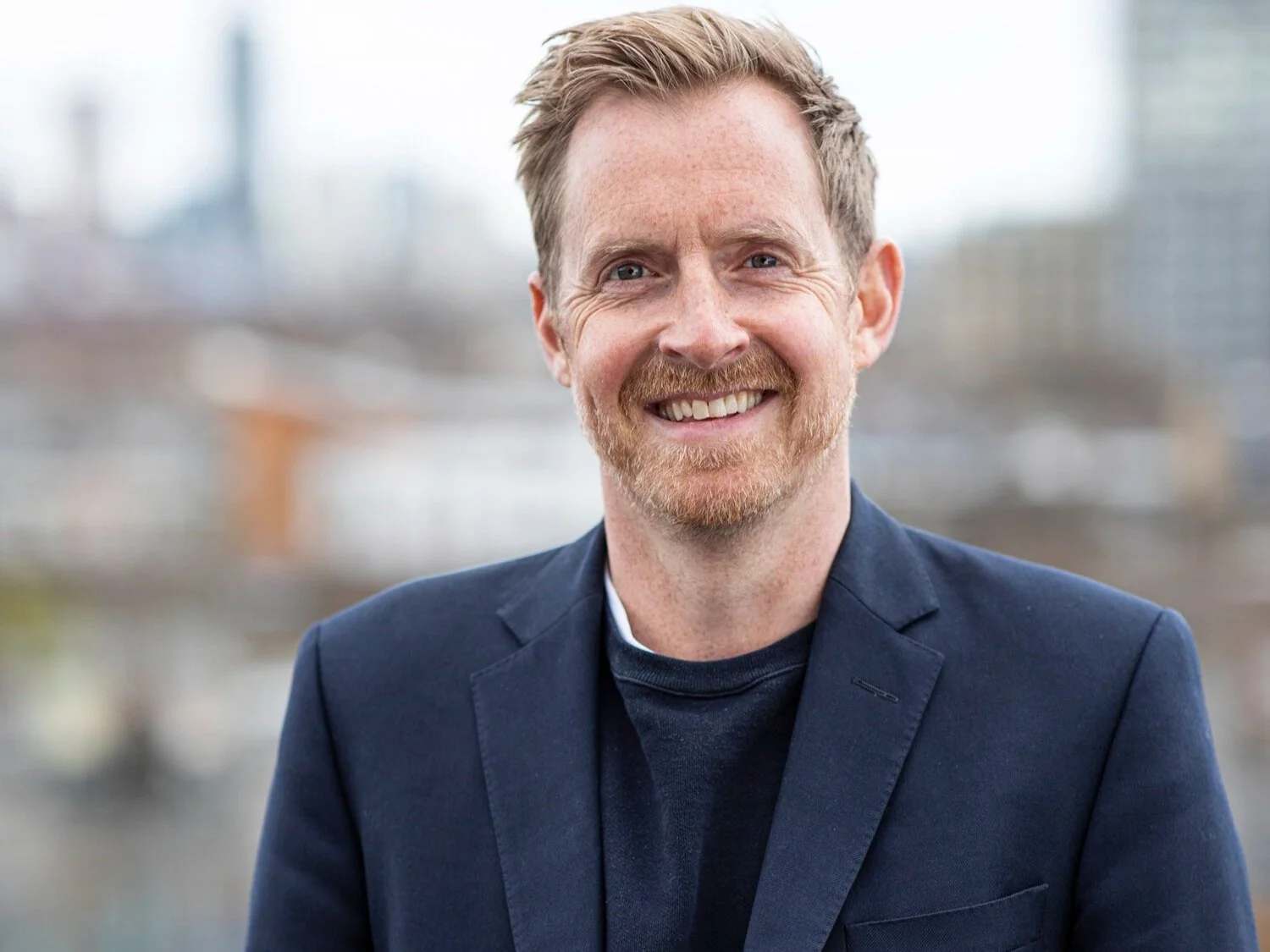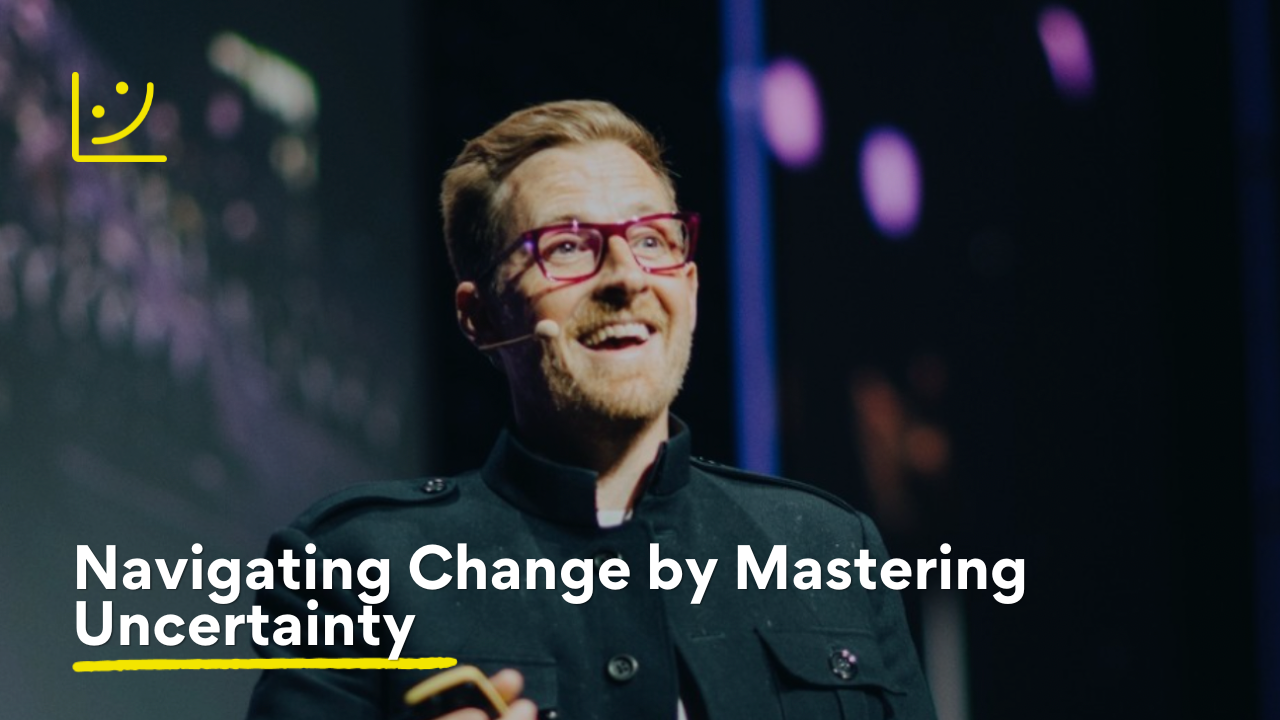Navigate change by mastering uncertainty
Being a purpose-led entrepreneur means that we want to make a positive impact on the world.
But we never know if our efforts are going to work out.
This can feel even more challenging when we’re doing things that are innovative, untested, or have deep meaning to us.
The uncertainty of building a business that matters can keep us awake at night. It can leave us feeling out of control and cripple our decision-making process.
Is it possible to make friends with uncertainty and even learn how to find something useful in it?
Because, as Jon Kabat-Zinn puts it, “You can't stop the waves, but you can learn to surf.”
Enter the uncertainty expert
On this episode of the Friday Fireside, we were joined by best-selling author, Sam Conniff.
Sam is best known for his book Be More Pirate, which has spawned a movement of changemakers and activists enlisting unconventional methods to trigger systemic change.
But in his latest venture, Uncertainty Experts, he has partnered with the Decision Making and Uncertainty Centre at University College London, which studies how individuals might make better decisions.
And he’s now leading the world's largest-ever piece of research into the human impact of uncertainty.
In both his career and his personal life, Sam has faced it all: launching start-ups that make a positive change in the world, unexpected career changes, financial breaking points, and the mental and emotional toll they’ve extracted.
This is a thought-provoking, informative, often vulnerable and inspiring conversation about life, uncertainty, and how to build greater resilience.
This one’s for you if…
You get anxious about uncertain futures and cling to the familiar, even when you know change is needed.
You want a deeper understanding of how to develop greater resilience
You’re looking to shift your uncomfortable relationship with uncertainty
You want to get science-based insights into why many of us struggle with uncertainty as much as we do.
Here are nine takeaways from the conversation:
1. What are you trying to put right?
While it can seem a counter-intuitive thing at first glance, we often talk about the entrepreneurial journey as a spiritual path. Putting ourselves on the line for an idea we believe in can be self-revelatory. Sam knows this first-hand.
“We sometimes think that we're in denial about it, but it's very much a part of the entrepreneurial condition, isn't it: What is it that we're all trying to put right?
And in some way, we'll answer that line; the magic you seek lies in the thing you're trying to avoid.”
2. Startups and uncertainty go hand in hand
If you’re a member of the Happy Startup School community, there’s a chance that you already have a higher-than-average tolerance for uncertainty. Why? Because you’re probably a founder, entrepreneur, or hoping to start a new business. As Sam identifies,
“Uncertainty can be a really generative space, and it can be a really exhausting space.
We show up every day trying to deal with the axiomatic truth that uncertainty in startups and entrepreneurship will always go together. Sometimes that’s limiting, and sometimes it becomes liberating.”
3. Uncertainty is universal
Uncertainty triggers a primal response in all of us. Before we can even think rationally, our bodies react as if under threat.
"Uncertainty is an autonomic response so, before your brain has even engaged in problem solving, your body, your alert systems, have picked up on what’s seen as a threat.
Fear and excitement show up in exactly the same way, so our opportunity is to try to increase our response to uncertainty as an excited one."
Learning tools for emotional regulation can help us respond more skillfully when we’re lost in fear (anxious, sleepless, fretful), fog (indecisive, confused, circular thinking), or stasis (stuck, purposeless, lost our mojo).
4. We will avoid uncertainty at any cost
Sam shared that a study revealed that given the choice between a synthesised experience or uncertainty or giving themselves an electric shock, 90% will choose the latter to avoid being in the state of the unknown.
"People prefer to know their plane’s two hours’ late than just know that it might be late. We try to create pockets of certainty to give us safe spaces, but sometimes they're a fake safe.
We will con ourselves that an old idea, an old relationship, some bad thing we've done before, is better than spending time in the unknown."
We will go to great lengths to avoid uncertainty, even clinging to known negatives over unknown possibilities. Conquering this instinct is key, especially when considering whether to quit a bad job to build our excite strategy.
5. Doubt has value
We’re all human and so, when uncertainty does hit, most of us will do anything to get out of it. Sam shared that if we get a real shock, it even reduces our problem solving capacity by around 35%.
We often ping-pong between being attracted to some things and avoiding others. But if we can find a third place between those states, we can become more available.
“An ability to go, “I don't know”, you know, and that perhaps doubt isn't always universally bad. Perhaps doubt allows for a place of discovery. Perhaps I don't feel like I need to always have the answers to this."
We're conditioned to avoid saying "I don't know." But healthy doubt can fuel progress, and trigger openings for discovery, innovation and creativity.
6. Uncertainty is generative
Though uncertainty makes us uncomfortable, it can also be the source of our most meaningful breakthroughs and innovations. Leaning into it can unlock creativity and a degree of aliveness when we beat the odds.
"If we can hold that space, it becomes a generative space.
I'd guess that everyone here, the best work of their lives, the most exciting stuff that we've done, the career points that we still tell people about, all had a relationship with being in the uncertain."
7. Success is scarier than failure
It’s common to believe that we’re all afraid of failure, but it’s often not as simple as that. Despite his outward success, including best-selling books and successful social enterprises, Sam isn’t immune to the insecurities that we all share.
"I realised that I'm way more scared of success than I am of failure .. kind of comfortable in failure. Quite like the idea of, you know, person who has good ideas and only gets close to them."
Achieving outward success can trigger our deeper insecurities. If the comfort zone of moderate success feels safer than risking major accomplishment, you’re not alone.
8. Imagine the unimaginable
It’s a cliche, but in an age of pandemics and AI, we’re living through unprecedented times. And times like these call for a greater level of innovation than simply sticking two things together and giving them catchy branding. As Sam points out,
"I think we're in a moment where we need to imagine the unimaginable. Chances are by virtue of heuristics and rules of thumb, when we think about the future, we think about updated versions of what we've seen before."
To create genuine breakthroughs, we need to take our sense of what’s possible beyond simply extrapolating from the past.
9. The threshold invites us
Sam believes that the best problem-solving minds in the world are now in the startup space, and that the role of the startup is hugely overlooked in terms of its future social contribution.
“I think it's a trend that's not going to diminish, and some of the big solutions that we're looking for over the next five years are going to come from this community.
So how do we step through that and imagine what we haven't seen before as a better version than what we've got now? And then how do we make that?
How do all the skills of entrepreneurship, taking ideas and manifesting them into reality with all that we've got, how does that come to bear?
I hope this work has a role to play in that, imagining a better future and a better version than we've seen yet.”
Our ability to tolerate uncertainty - to have that “negative capacity”, as Keats put it - varies with each individual.
But knowing how to navigate it is important if we’re to deliver the change many of us wish to create in the world.
Uncertainty is much easier to face in the company of fellow travellers, and with guides who have your back.
Do you want to make a change you feel unsure about? We’re currently taking applications for our next Vision 20/20 program.
Join us and discover the support and structure you need to create a brighter future.
Notes
Many thanks to Sam Conniff for his time. You can find our more about his work on his website, how to rewrite the rules at How to Be a Pirate, and take part in his research at Uncertainty Experts.
If you’d like to find your deeper purpose at work, our next tribe of our Vision 20/20 program starts March 2024.





